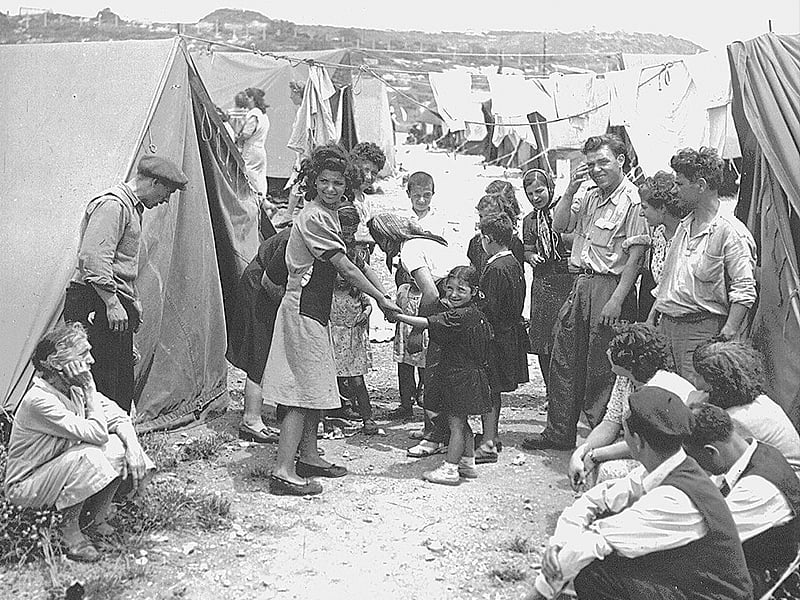
Nov. 28, 2018
OPINION | By Ashley Perry (Perez)
The opinions, facts and any media content presented do not necessarily reflect the position of B’nai Brith Canada.
This article was originally published on JNS.org.
Do you know what we commemorate on Nov. 30?
Sadly, for most Israelis and Jews around the world, it is just another day. However, according to a law passed in 2014 by Knesset member Dr. Shimon Ohayon (with the assistance of this author), this is now the date of the official day of commemoration for Jewish refugees from Arab countries.
It should be an important day on the official global Jewish calendar because the Jews of the Middle East and North Africa are an essential part of Jewish history, even for those whose ancestors did not come from there.
One of the issues I was able and proud to raise during my time in government was of the ethnic cleansing of almost a million Jews from the Middle East and North Africa—communities massively predating Islam and the Arab conquest of the region in the 7th century, and the appropriation of their assets estimated in today’s prices to be many billions of dollars.
Unfortunately, this history—the forced exodus of Jews who, along with their descendants, constitute the majority of Jews in Israel—is barely studied, mostly ignored and seemingly of little interest to the general population and even to Diaspora Jewry.
Apart from the great work of organizations like Jews Indigenous to the Middle East and North Africa, Justice for Jews from Arab Countries and Harif, I was amazed that the issue had only seldom been raised in any meaningful way around the world.
Growing up in a thriving Jewish community, attending a Jewish school, and being involved in the Jewish community and Zionist organizations, I am astounded now, thinking back, how little was taught about the long and illustrious history of the Jewish communities of the Middle East and North Africa, and their subsequent expulsion.
How many are taught about the Jewish communities of Algeria, Egypt, Syria and Yemen—to name but a few of many nations now completely without a Jewish presence?
While in government, we often raised this issue on the international stage and at the foreign ministry under the leadership of then-Foreign Minister Avigdor Lieberman and even initiated a now annual event at the United Nations solely devoted to the issue of the Jewish refugees from Arab countries with our partners in the World Jewish Congress and the Conference of Presidents of Major American Jewish Organizations.
WATCH: The Silencing of Jewish Suffering in Syria
However, the more we pressed the issue, which by international, U.S. and Israeli law must be part of any resolution to our conflict, the more I understood that Jews in Israel and abroad are not even aware of it.
Dr. Ohayon created for the first time ever a Knesset caucus for Jewish refugees from Arab countries, and although the meetings were well-attended and frequent, the attendees were mostly the survivors of pogroms in the Arab world and the expellees themselves, and few from the following generations.
To spread greater understanding of the issue abroad, with the Ministry of Foreign Affairs Bureau for World Jewish Affairs and World Religions, headed by Akiva Tor, we created a traveling exhibition that would be sent to embassies, consulates, Jewish communities and organizations around the world to print out locally and display at relevant events surrounding the date. (The exhibition is still available for anyone who wants to receive the PDF slides.)
Every year, more events are held around the world,organized with the assistance of Israel’s embassies and consulates, and the local Jewish communities. But it is still not enough. We can still see that the history of the Jews from the Middle East and North Africa is not even close to the global Jewish agenda.
It is rarely part of any high-level Jewish or pro-Israel conference, barely touched in any pedagogic or educational syllabi, or addressed by any mainstream Jewish or pro-Israel organizations.
Before we ask the world to recognize and address their moral, legal and historic rights, we should inform ourselves about the history of the communities, as well as their cleansing and extinction during the 20th century.
For many around the world, Jewish history and culture is largely defined by the Jews of Eastern and Central Europe. Still, the Jewish communities of the Middle East and North Africa bestowed great scholarship, cultural and economic successes on many occasions without parallel anywhere in the world.
It is an uphill battle and one our opponents do not want to become widely known because it flips on its head all standard notions about the conflict, including conquest, oppression and indigeneity. I know of an academic who tried to hold a purely historical conference on the history of the Jews of the Middle East and North Africa, and was turned away by dozens of American universities, even Jewish-studies departments, because the subject matter was considered “too controversial.”
Digest that for a moment: the 2,000- to 3,000-year history of Jewish communities—their achievements, their successes, their suffering.
We should not allow the suffocation and extinction of these historic communities to be erased from the pages of history. We should share their stories and keep their memories alive, especially their destruction, which was largely ignored around the world.
Please join us in making Nov. 30 not another day, but a vital date in our calendar where we are free to talk about history, rights, redress and justice.
Ashley Perry (Perez) is an international strategic consultant, content manager and creator, and public-relations adviser to companies, organizations and individuals in a variety of fields and arenas at the highest levels globally.


